- I Wrapped Her In Ribbons/Hermit And The Knight (Deram DM 306) 1970
- Strange Pleasure (Deram Nova (S)DN 4) 1969
- New Dawn (Deram SML 1075) 1970
Galliard

BIRMINGHAM
Revised May 2023
Andy Abbott bass guitar, vocal
Geoff Brown vocal, guitar, keyboards
Dave Caswell trumpet
Lyle Jenkins saxophone (joined in 1969)
Les Podraza drums
John Morton trombone
Richard Pannell lead guitar, sitar, keyboards
John Smith saxophone (left in 1969)
"Like Blood Sweat & Tears meets The Soft Machine!"
Written by Geoff Brown
Galliard, formed in Birmingham during the summer of 1968, were one of the few progressive rock bands from the city at that time. They were, in essence, a much-augmented later metamorphosis of Craig, the four-piece who recorded the fearsome 'I Must Be Mad'. Galliard cut two albums, 'Strange Pleasure' and 'New Dawn', released on the Deram Nova label, both of which were produced by Phil Wainman, drummer and future Bay City Rollers' manager.
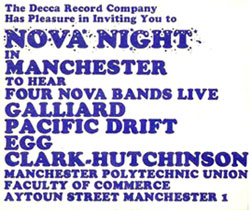
In a review of Galliard, music journalist Dave Thubron wrote; "Much of Galliard's albums are like 'a happening'. A pop band who've gone progressive are performing at the same time as a brass section who were soul but have now got into free-style jazz; or like listening to two radios, one tuned to pop one tuned to jazz (but without the discordance). It is a great mix." Someone once summed them up with the following words after seeing them live for the first time; "Like Blood Sweat & Tears meets The Soft Machine." Now that's an eclectic mix!
But how did this mash-up come about?
The four members of Craig went their separate ways in 1966. Carl Palmer went off to join Chris Farlowe's Thunderbirds, and then went to 'The Crazy World of Arthur Brown'. He later became part of the very successful "Emerson, Lake & Palmer" trio. Geoff Brown went off to British Leyland's computer department as a programmer, which stood him in good stead when many years later he set up an international game publisher, US Gold. Len Cox dropped out of the music scene to reappear many years later as a priest. Richard Pannell went on to finish his electronics' degree - the skills gained proving very useful when he later became the sound engineer for ELO (see The Move).
After Craig, Richard Pannell began playing guitar semi-pro with an Irish showband led by vocalist John Fitzgerald called "The Castaways" (coincidentally the same name as the first band Geoff and Richard formed in '62, which later became The King Bees). Also playing in the showband were John Smith (sax), Dave Caswell (trumpet), Andy Abbott (bass), and drummer Frank McGonagle. In late 1967 Richard asked Geoff if he would like to join the band on a semi-pro basis as it was only playing weekends and Geoff agreed. Like most Irish showbands at the time the music was an eclectic mix, but what worked really well were the soul-based Stax-type songs with the brass section.
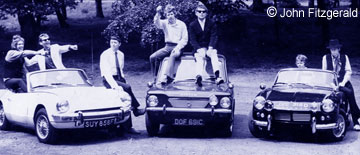
Tiring of the Showband scene, Geoff suggested they form a regular band and concentrate on the soul aspect of the music. Stax was the vogue label at the time and with the brass laden tracks they were ideal songs for the band to cover. Geoff was singing confident lead vocals having cut his teeth on blues with the King Bees. In mid-1968, the band was launched as 'Immediate Pleasure' and played the local clubs such as The Rum Runner and The Cedar Club, gaining a small but enthusiastic group of fans.
Like most bands there are a couple of seminal things that influence the direction and musical genre that any band decides to play; the ability and influence of the leading band members, and the prevailing styles of music around at the time. In the case of Immediate Pleasure it was Geoff's eclectic music tastes linked with Dave and John's jazz background plus Richard's expertise in electronics and experimentation.
In addition, groups were emerging in the USA that included brass sections in the line-up, the most notable being "Blood, Sweat and Tears" with their 1968 album 'Child is Father to the Man' followed in April 1969 later by "Chicago" with 'Chicago Transit Authority'. Both these bands at the time seemed to Geoff to be an exciting new genre of music that Immediate Pleasure could tackle as it had the line-up to attempt it. It also sparked off Geoff's songwriting skills again.
"There are haunting tunes with a folk-rock base..."
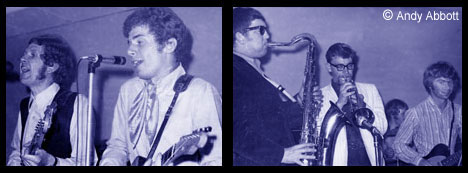
A somewhat obscure North American group called "Ars Nova", who released an album 'Ars Nova' in 1968 that had an intriguing mix of psychedelic rock with classical overtones and a brass section, caught the band's interest. The iTunes review of the album almost sums up where Galliard's initial inspiration came from; "There are haunting tunes with a folk-rock base and a faint Renaissance ballad melodic influence - and harder rocking period psychedelic tracks with a bent for unpredictable bittersweet progressions and vocal harmonies..." This eclectic mix was the spark for Geoff to ignite the inspiration for Galliard. The galliard was a popular medieval dance of the 16th century and, influenced by the sound of Ars Nova, Geoff wrote a song for the first album called 'Frog Galliard' and named the band after it.
Strangely enough, for a relatively unknown band, Ars Nova must have been listened to by other Birmingham musicians as one of their album tracks 'Fields Of People' was released by The Move on their 1970 album 'Shazam'. There were other influences in the band though which came from the jazzy brass section and also the early blues songs that the King Bees had played. Slowly, but surely Galliard was developing its own eclectic style.
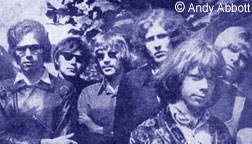
Frank, the drummer, was not interested in the new direction the band was taking and the search was on for a drummer that would complement and enhance Geoff's Galliard songs and the final piece of the Galliard sound came when Les Podraza joined the band in February 1969. Les was a young, local Birmingham musician who had just come off tour with Tim Rose where he replaced John Bonham on drums.
Les was very creative and so with his drumming and Andy Abbott's original tight bass playing the rhythm section was complete and could easily match the different styles that the band was incorporating. Andy, very influenced by the playing of Blood, Sweat & Tears' Jim Fielder, was also taking some lead vocal parts and singing harmony with Geoff to augment the overall vocal sound. Once Les joined the band, they started to gig solely as Galliard with original material mostly provided by Geoff.
Galliard was still operating semi-professionally, but was building up a major following around the Midlands and on the college circuit, and was starting to support headlining bands - sometimes stealing the show! The band was managed at the time by Alan Clayton of Astra Agency in Wolverhampton, and it was Alan who arranged for Galliard to audition for a new record producer, Phil Wainman, who was looking to step into the emerging progressive rock scene. Decca were launching a new progressive label at the time, Deram Nova, and Galliard produced by Phil was an ideal band to be amongst the first wave of album releases.
"Strange Pleasure"
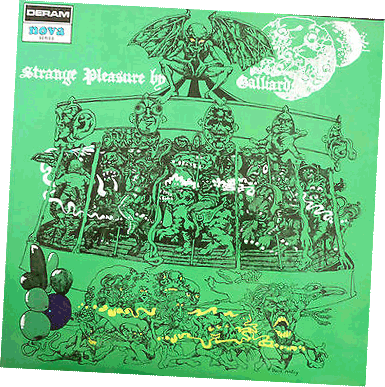
By this time, Galliard had amassed enough songs to fill an album and went into Olympic Studios in London to record their first LP entitled 'Strange Pleasure', the fourth album released in the Deram Nova catalogue in November 1969. The mix of songs was very eclectic with the opening track being an arrangement of an old traditional blues classic 'Skillet Good 'n Greasy' first heard by Geoff on Davy Graham's 'Folk, Blues and Beyond' 1964 album - but what an arrangement, with classic guitar build-up riffs, plus a blasting horn arrangement straight out of the BS&T bag.
The album also included Galliard's first single, 'I Wrapped Her In Ribbons' a haunting folk-type song punctuated with a brilliant brass arrangement and great trumpet solo in 5/4 time (edited out for the single). The B-side was 'The Hermit And The Knight', a song written by Dave Caswell and included on the second Galliard album.
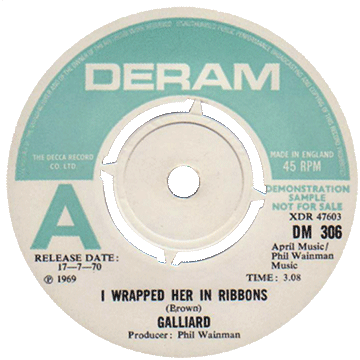
An interesting note is that, of all people, Frank Ifield recorded Galliard's 'I Wrapped Her In Ribbons' as a B-side to his single 'Three Good Reasons' in May 1970. Why, or how, he chose the song Geoff has no idea. Other highlights of the album were backward guitar solos, sound effects, harmonica and classical trumpet solos amongst other original touches.
The band was by this time recognized as one of the new-wave of progressive rock bands and following the impact of the first album went back into the studios in late 1969 to commence work on the next album 'New Dawn'. John Smith the original sax player had become increasingly unreliable and had been replaced by a tremendous new player friend of Dave's, Lyle Jenkins. The only trouble with having such a brilliant brass section was that it was being eyed by other bands of much higher recognition than Galliard at the time.
"New Dawn"
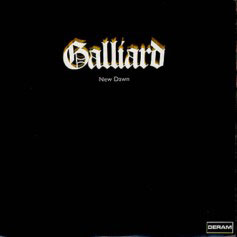
The second album, 'New Dawn', was recorded in the Beatles' legendary Abbey Road Number 2 studio. Surrounded by an array of extra instruments (including the famous Mellotron from 'Strawberry Fields'), the band included supplemented brass sections, sitars, keyboards, sine-wave generators, accordion, harpsichord and other creative inputs that meant it took longer to record than the first album. The album, again produced by Phil Wainman, was far more ambitious and polished than the first album and the band had finally found its own sound.
The first two tracks; the classic 'New Dawn Breaking' written by Geoff with a great brass arrangement by Dave Caswell and a stunning free-form sax-solo from Lyle Jenkins, and 'Premonition', an instrumental written by Dave, were both finished by February 1970. The third track with them playing trumpet and sax, 'Your Mind's Eye', was completed by March. Then, out of the blue, both Dave and Lyle were poached by "The Keef Hartley Band". Understandable now as Keef Hartley was an established professional London band with a big following, but at the time it was a massive blow and it was hard to replace them. Keef Hartley subsequently lost Dave and Lyle to "Ashton Gardner & Dyke".
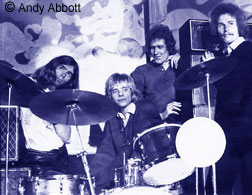
Dave and Lyle played together in various bands following AG&D and Dave went on to play with some very high profile bands and artists such as The Who, Elkie Brooks, Rick Wakeman, Randy Crawford, The Yellowjackets, Paul McCartney and many others. Lots of information about Dave and Lyle's subsequent gigs following Galliard is available on: http://musiciansolympus.blogspot.com/2010/07/davecaswell-trumpet.html, and http://musiciansolympus.blogspot.com/2010/07/lylejenkins-sax.html
Undeterred, the remaining Galliard line-up was determined to get the album finished. John Morton, a local trombone player and arranger, and a friend of Geoff's, was the key to providing the musicians and working alongside Geoff on the arrangements for the remaining tracks of New Dawn. He also contributed as a co-writer with Geoff on a couple of new songs for the album.
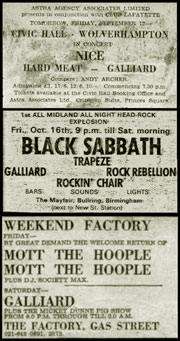
Galliard were back in the studio in May 1970 with a new line-up to include John Hughes brass arranger and trombone/keyboards, Tony Roberts (sax), and Harry Becket - a session trumpeter to complete the album. The first track, 'Winter-Spring-Summer' with this ensemble was recorded on the 3rd May 1970 with a stunning flugelhorn solo by Harry Becket, followed by one of Geoff's favorite tracks, 'Open Up Your Mind' on the 31st May. The album was completed in July and released in September 1970.
The excitement of the track 'New Dawn Breaking' can be experienced in a stunning new video interpretation of the song on Youtube at: http://www.youtube.com/watch?v=purWf48ZRvg
John Peel had a major radio-show at the time and invited Galliard to appear live twice earlier in the year when Dave and Lyle were still with the band. The recordings are still available as bootlegs and show how exciting the band could be in a live setting. The band was then a 6-piece with John Morton on trombone and Bob Rae on sax/trumpet.
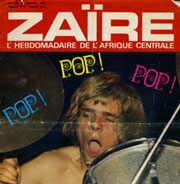
1970 was a busy year for Galliard with lots of live performances plus a gig in June at the legendary "Festival of The Midnight Sun" at the Mantorps Racing Circuit in Sweden. This gig though was played as a quartet with no brass section as the guys couldn't make it and it became clear to the band that the cost of touring with a brass section, plus the unreliability of the players and the changes of personnel made it necessary to revert back to the four-piece guitars, bass and drums line-up. This was the line-up that went, inexplicably, to the Belgian Congo in November 1971 to play for Mobutu's presidential celebrations - and came back alive!
Losing the brass section was not a detrimental thing for Galliard who continued to thrive and tour with the quartet line-up. Richard still played sitar and Geoff supplemented with keyboards as synthesizers slowly started to creep into rock group line-ups.
"Helicopter"
Phil Wainman meantime, with his pop successes, wanted to record Galliard under a different name. The same line-up released a single in 1971 under the name of "Helicopter" on Phil's own 'Maple Annie' label with a song written by Geoff entitled 'I Belong To Yesterday' which featured Richard on his legendary sitar. The band unfortunately by then had lost its way. The lack of success at the time of the albums had disheartened the guys and Les decided to quit.
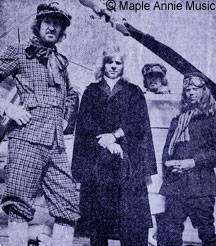
Geoff had by then moved on from progressive rock to more commercial music and was attracted to the keyboards and the possibilities that they offered, especially the new electronic samplers and other synthesizers. It was really the end of the road for Galliard as Geoff's new songs moved the band in a new direction towards funk/jazz black-American influenced music that got Geoff and Andy back to their R&B/Blues roots, which was not the direction that all the band wanted to go in. It also got the band more work as they switched to the Birmingham-based Fewtrell/Tully agency and started to work in more night clubs than colleges.
Richard Pannell eventually left in 1973 and joined E.L.O. (see The Move) as their permanent sound engineer. Some more information about Richard's subsequent career is on Martin Kinch's web site at: www.cherryblossomclinic.freeserve.co.uk/index.html.
Les Podraza moved on as he wasn't interested in the new music, to be replaced firstly by the late Fred Woolley, followed by Steve James, and then another Geoff drummer discovery, Mel Gaynor (Carl Palmer being the first). Mel later went on to fame with Simple Minds! Lyle Jenkins is still playing and runs a jazz club and teaches sax/woodwinds in Essex. Dave Caswell is retired but still active with local bands in Dorset. He commutes to Germany each year for serious jazz gigs.
Geoff's next band to take the stage and make an impact in Birmingham and the recording scene was "Muscles" who became Birmingham's answer to "Level 42", but that's another story!
An interesting footnote to this story is it seems, like Craig's single, 'I Must Be Mad', that it takes time for any Geoff Brown band and songs to mature. Both of the Galliard items are considered to be classics of the progressive-rock era with vinyl copies, according to Google searches, being collector's items. Both albums were released in 2009 as CD reissues on Cherry Red/Esoteric with the following details:
Galliard Strange Pleasure (Esoteric). Galliard's 1969 debut album is dusted off and re-mastered, making the Birmingham group's fascinating fusion of prog, psych and folk sound more vital than ever before. Galliard New Dawn (Esoteric). Re-mastered edition of the second album - originally issued in 1970 - by the eclectic UK band best known for integrating brass into their progressive rock sounds.
For more information about these CD releases and how to order, visit the Cherry Red/Esoteric web site at: www.cherryred.co.uk
Many thanks to Geoff Brown writing the Galliard story and for permission to show it here along with images of the group. Thanks also to Les Podraza and Richard Pannell for additional input.
Copyright © 2011 Geoff Brown
You can visit Geoff Brown's MySpace music page at: myspace.com/geoffbrownrecords
Galliard 1960s Record Releases
Singles:
Albums: